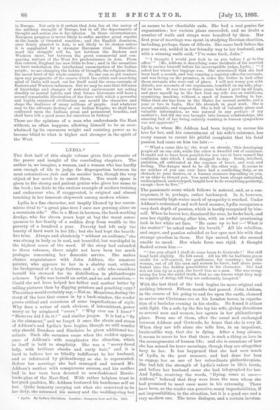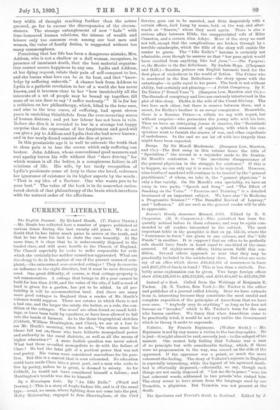LYDIA.* THE first half of this single volume gives little
promise of the power and insight of the concluding chapters. The author is, we imagine, a woman, and a woman who has hardly seen enough of life to judge the disproportion between its most ostentatious fade and its secular laws, though the very object of her novel is to assert them. Too much space is given to the strong and patient genius who gives her name to the book ; too little to the curious example of modern training and endeavour who, if exaggerated, is original and almost touching in her innocent shipwreck among modern whims.
Lydia is a fine character, not inaptly likened by her uncon- scious rival to "a great pine-tree I once saw growing alone on a mountain side." She is a Muse in harness, the hard-working drudge, who for eleven years kept at bay the worst conse- quences to her family of a sudden drop from wealth to the poverty of a hundred a year. Poverty had left only the beauty of hard work in her life; but she had kept the hearth. fire trim. Always and absolutely " without an audience," she was strong in body as in soul, not beautiful, but worshipful in the highest sense of the word. If the story had extended to three volumes, there might not have been too much prologue concerning her domestic service. She makes chance acquaintance with John Addean, the amateur painter, who appears to her in a shabby coat, without the background of a large fortune, and a wife who considers herself his steward for its distribution in philanthropic schemes. Lydia was herself an artist, and we ask ourselves,--- Could she not have helped her father and mother better by selling pictures than by digging potatoes and poaching eggs P The author would certainly say,—Not so. Meantime, during the story of the love that comes in by a back-window, the reader grows critical and conscious of some imperfections of style. Why does a writer of such obvious, if intermittent, power worry us by misplaced " evers." " Why ever am I here ? " "However did I do it ?" and similar jargon. It is but a " fly in the ointment," and we forget it once the strain and stress of Addean's and Lydia's love begins, though we still wonder why should Dundass and Sinclaire be given additional ter- minals. Such idle surmises cease when the sudden appear- ance of Addean's wife complicates the situation, which in itself is bald to simplicity. She was a " merry-faced lady, with brilliant cheeks and curly hair," and it is hard to believe her so blindly indifferent to her husband, and so infatuated by philanthropy as she is represented. Before her marriage she had managed and nursed Mr. Addean's mother with conspicuous success, and his mother had in her turn been devoted to new-fashioned Borrio- boola.ghas of the East-End. With rather helpless trust in her good qualities, Mr. Addean bestowed his handsome self on her. Quite honestly carrying out what she conceived to be her duty, she esteemed his money and the wedding-ring but * Lydia. By Sydney Christian. London : Sampson Low and Co. MS. as means to her charitable ends. She had a real genius for organisation ; her various plans succeeded, and no doubt a number of waifs and strays were benefited by them. Her first year of marriage was spent in studying Russian charities, including, perhaps, those of Siberia. She came back before the year was out, nodded in her friendly way to her husband, and with a winning smile said, "I've come back, John."
" I thought I would just look in on you before I go to the office.' " [Mr. Addean is describing some incidents of his married life to excuse himself before his incorruptible judge, Lydia.] "I asked her where her luggage was. She announced that she had been back a month, and was running a registry-office for servants, and was living on the premises, in order the bettor to look after those servants who were out of place. I will not weary you with details, nor accounts of our arguments, heartfelt on my side, play- ful on hers. It was two or three years before I gave up all hope, and gave myself up to the fact that my wife was an ambitious, organising machine, without a spark of human feeling in her. Since then she has been in the States for several months, and a year or two in India. Her life abounds in good work. She is moral, amiable, and respected. She is full of valuable plans and valuable information, as was natural in any proidgee of my mother's; but till she was brought into human relationships, the amazing fact of her being entirely wanting in human sympathies was not apparent.' " Lydia, to whom Mr. Addean had been trying to excuse his love for her, and his concealment of his wife's existence, has every reason to resent his pitiful complaint that his fatal passion had come on him too late :— • "' What a curse this is,' she went on sternly, ' this developing people all on one side, while the other is dwarfed out of existence. It ought not to have been possible for you two to have caused the confusion into which I stand dragged to-day. Brain, intellect, ambition, all cultivated at the expense of heart, and soul, and feeling. The danger used to be all the other way. It seems to me neither of you can ever have had a conflicting duty, or an obstacle to your desires, or a human creature depending on you, or an elder to thwart you. You must have been always untrained, undisciplined, undeveloped, taught how to do everything perfectly,. except—how to live.' " The passionate scene which follows is natural, and, as a con- sequence, it is, perhaps, rather hackneyed. In it, however, one unusually high-water mark of sympathy is reached. Under Addean's restrained and well-bred manner, Lydia recognises a very dark depth of passion, which is hardly recognised by him- self. When he leaves her, dismissed for ever, he looks back, and sees her rigidly staring after him, with an awful questioning look in her white set face. " He came up to her What is the matter ' he asked under his breath." All his rebellion, and anger, and passion subsided as her eyes met his with that strange question in them. Her lips moved, but she seemed unable to speak. Her whole form was rigid. A thought flashed across him :- "' Are you afraid I shall do some harm to Gertrude ' Her stiff head bent slightly. He felt awed. All his life he had been given. credit for self-control, for gentleness, for courtesy ; but this woman, out of all the men and women he knew, had alone pone- trated into the hidden possibilities in his character. She had not set him up as a god, she loved him as a man. She was recog- nising for him the awful truth, that no one knows what they may be capable of doing, till they are sufficiently tempted."
With the last third of the book begins its more original and striking interest. Fifteen months had passed. John Addean, in the course of his going to and fro upon the earth, chanced to arrive one Christmas eve at his London house, in expecta- tion of a bachelor evening in his studio. He found it ablaze with light. On a sofa by the fire lay his wife, giving directions to several men and women, her agents in her philanthropic plans. From one of them, after the usual nod exchanged between Addean and Gertrude, he hears that she is very ill. When they are left alone she tells him, in an impatient, businesslike way, that she is dying. After a long silence, it seems to occur to her that there is such a thing as love in the arrangements of human life; and she is conscious of how she has missed its truer meanings, though they are altogether hazy to her. It has happened that she had seen much of Lydia in the past summer, and had done her best to engage her as one of her subordinate philanthropists. She had felt the strength of Lydia's valour in life's battle, and before her husband came she had telegraphed for her. And Lydia, receiving the words, "Dying, come at once- Addean," believed that they were from the man whom she had promised to meet once more in his extremity. There have been, as the reader can perceive, many improbabilities, if not impossibilities, in the situation, but it is a good one and a very modern one. The terse dialogue, and a certain involun- Vary width of thought reaching further than the actors guessed, go far to excuse the discrepancies of the circum- stances. The strange entanglement of new " fads " with time-honoured human relations, the misuse of wealth and leisure only too common even among our best men and women, the value of family duties, is suggested without too many commonplaces.
Perceiving that her life has been a dangerous mistake, Mrs. Addean, who is not a shallow or a dull woman, recognises, in presence of imminent death, that the best material organisa- tion cannot secure happiness to any one. Lydia and Addean, at her dying request, relate their pain of self-conquest to her, and she learns what love can be at its beet, and that "know- ledge by suffering entereth." A chance look from Addean to Lydia is a pathetic revelation to her of a world she has never known, and it becomes clear to her "how inextricably all the interests of a set of people may be bound up together, till none of us can dare to say I suffer uselessly.' " It is for her a criticism on her philanthropy, which, blind to the true uses, and also to the true cures, of suffering, had spent eleven years in snatching thimblefuls from the ever-recurring waves of human distress ; and yet her labour has not been in vain. Before she dies it is revealed to her in a strange but happy surprise that the expression of her forgiveness and good-will can give a joy to Addean and Lydia that she had never known ; and in her newly-found content she dies at peace.
In this pessimistic age it is well to reiterate the truth that to shun pain is to lose the crown which only suffering can bestow. John Addean, whose conventional good manners and real apathy leaves his wife without that slave driving" for which woman is all the better, is a conspicuous failure in all relations of life. His wife, by her tardy recognition of Lydia's passionate sense of duty to those she loved, redresses her ignorance of existence in its higher aspects by the words : " That is my idea of a Saviour. One who wants you to be your best." The value of the book is in its somewhat carica- tured sketch of that philanthropy of the brain which interferes with the natural order of the affections.



































 Previous page
Previous page